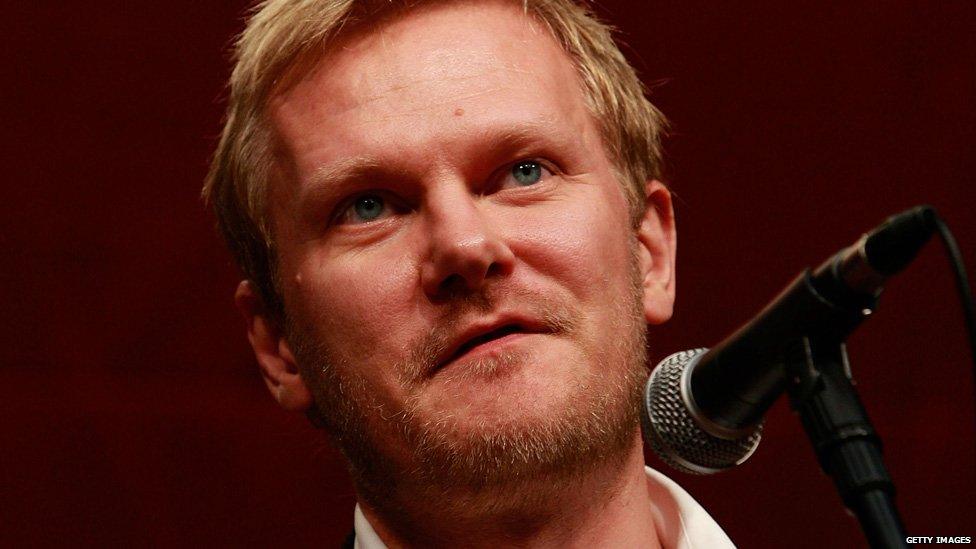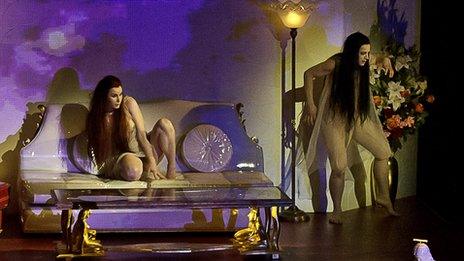Royal Opera boss Kasper Holten steps down
- Published

Kasper Holten has caused controversy with his daring staging of some classic productions
Kasper Holten, the Royal Opera House's (ROH) director of opera, has announced he is to leave the company at the end of March 2017 and return to Denmark.
Holten, who has been at the ROH in London's Covent Garden since 2011, said it felt "very painful" to leave.
However, his departure appears to be amicable as Holten also said he had turned down the offer to renew his contract for family reasons.
The search for his successor will begin in the new year, the ROH said.
This past summer, Holten was offered a five-year extension to his time at the leading venue by Alex Beard, the ROH's chief executive.
Holten declined, but instead asked for seven months to give him time to direct a new production of Wagner's Meistersinger early next year.
Holten said in a letter to colleagues: "I love working at the ROH - and with all the amazing colleagues here.
"But when I moved to London, my partner and I didn't have children. Now we do, and after much soul searching we have decided that we want to be closer to our families and inevitably that means we make Copenhagen our home where the children will grow up and go to school."
Boos and walkouts
Mr Beard said: "Kasper Holten is a wonderful colleague and a good friend, and continues to bring extraordinary energy and vision as our director of opera.
"While I had very much hoped to work with him through to 2020 and beyond, I understand and respect his reasons for moving back to Copenhagen."
Antonio Pappano, the ROH's director of music, also praised his colleague: "Kasper Holten has been electric during his time at the Royal Opera House, demonstrating an uncanny energy, perseverance and vision for the future of our great institution.
"My collaboration with him on Krol Roger was one of the most fruitful experiences I have had during my time at this theatre. I am very sad that he has decided he must leave, as I believe it will be a major loss for our company."
Holten's time at the ROH has not been without controversy. In early 2012, audience boos and walkouts greeted a modern-dress staging of a Dvorak work.
The reason for the outrage was Holten's decision to set Rusalka - a version of The Little Mermaid - in a brothel populated by provocatively dressed prostitutes.
"It is OK to have divided opinion when you try to move the boundaries," said Holten at the time.
Similarly, this summer, audiences were unhappy with the ROH's staging of William Tell, with the opening night again marked by boos, this time over a rape scene with nudity.
Holten's reaction was to apologise, saying he was sorry if some of the audience found the scenes "distressing" but he added: "The production intends to make it an uncomfortable scene, just as there are several upsetting and violent scenes in Rossini's score."
He said the scene "puts the spotlight on the brutal reality of women being abused during war time, and sexual violence being a tragic fact of war".

Analysis by Will Gompertz, Arts editor
The director of opera at The Royal Opera has announced he is to leave the Company at the end of March 2017 and return to Denmark.
The first thing you notice when meeting Kasper Holten is his energy and enthusiasm. Hang around a little longer and you discover a serious figure who is open-minded about his art form and experiential in his approach.
They are good attributes for an organisation such as the Royal Opera House, that is genuine in its desire to develop new audiences and push the boundaries of opera.
But it's not easy. It is an inherently conservative organisation with an old-school establishment core audience.
I suspect Holten will feel creatively freer in a more avant-garde environment, which Copenhagen is likely to provide.
He says he's going home to bring up his family. But maybe there's also an element of flying off before his wings have been clipped.
Do expect him to carry on innovating. Don't expect him to take up the vacancy at the English National Opera.
It's a loss - in my opinion - for London and the Opera House.
- Published30 June 2015

- Published1 March 2012
